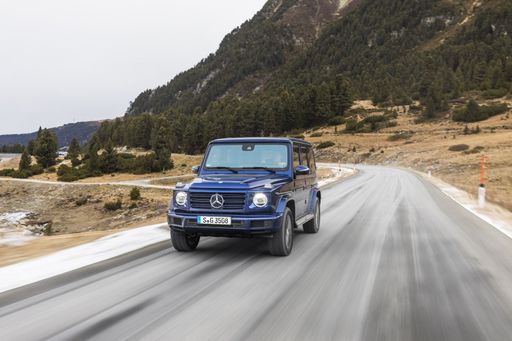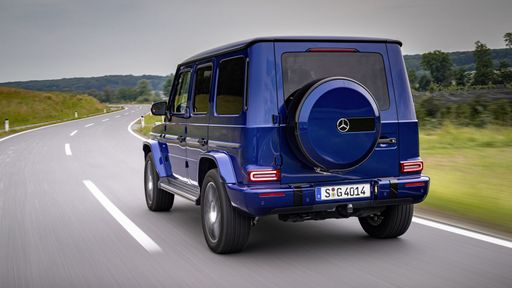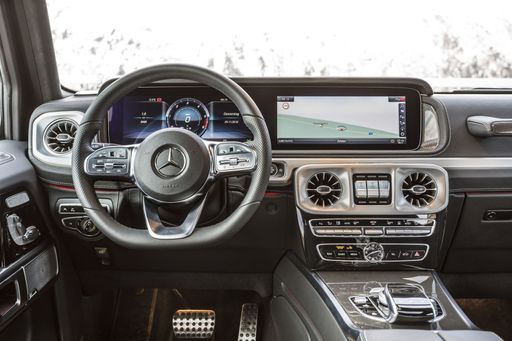Mercedes G Class vs Toyota Proace Max – Which one offers the better deal?
Both models have their strengths – but which one suits you more?
Compare performance, efficiency, price and space directly: Mercedes G Class or Toyota Proace Max?
Costs and Efficiency: Price and efficiency are often the first things buyers look at. Here it becomes clear which model has the long-term edge – whether at the pump, the plug, or in purchase price.
Toyota Proace Max has a clearly advantage in terms of price – it starts at 35500 £, while the Mercedes G Class costs 106600 £. That’s a price difference of around 71043 £.
Fuel consumption also shows a difference: Toyota Proace Max manages with 7.30 L and is therefore to a small extent more efficient than the Mercedes G Class with 8.70 L. The difference is about 1.40 L per 100 km.
In terms of energy consumption, the advantage goes to the Toyota Proace Max: with 26.20 kWh per 100 km, it’s hardly perceptible more efficient than the Mercedes G Class with 28 kWh. That’s a difference of about 1.80 kWh.
As for range, the Mercedes G Class performs slight better – achieving up to 468 km, about 44 km more than the Toyota Proace Max.
Engine and Performance: Power, torque and acceleration are the classic benchmarks for car enthusiasts – and here, some clear differences start to show.
When it comes to engine power, the Mercedes G Class has a significantly edge – offering 605 HP compared to 279 HP. That’s roughly 326 HP more horsepower.
In terms of top speed, the Mercedes G Class performs clearly perceptible better – reaching 220 km/h, while the Toyota Proace Max tops out at 161 km/h. The difference is around 59 km/h.
There’s also a difference in torque: Mercedes G Class pulls significantly stronger with 1164 Nm compared to 450 Nm. That’s about 714 Nm difference.
Space and Everyday Use: Cabin size, boot volume and payload all play a role in everyday practicality. Here, comfort and flexibility make the difference.
Seats: Mercedes G Class offers evident more seating capacity – 5 vs 3.
In curb weight, Toyota Proace Max is a bit lighter – 2075 kg compared to 2485 kg. The difference is around 410 kg.
In maximum load capacity, the Toyota Proace Max performs significantly better – up to 17000 L, which is about 14990 L more than the Mercedes G Class.
When it comes to payload, Toyota Proace Max convincingly takes the win – 1460 kg compared to 715 kg. That’s a difference of about 745 kg.
Who comes out on top?
Overall, the Toyota Proace Max shows itself to be shows small but notable strengths and secures the title of DriveDuel Champion.
It convinces with the more balanced overall package and proves to be the more versatile choice for everyday use.
Toyota Proace Max
Mercedes G Class
The Mercedes-Benz G-Class stands as a symbol of rugged luxury, combining robust off-road capabilities with sophisticated design. Its iconic boxy shape and imposing presence are complemented by a lavish interior that offers a blend of comfort and cutting-edge technology. Despite its longstanding heritage, the G-Class continues to evolve, maintaining its status as a premier choice for those seeking both adventure and opulence.
details @ group-media.mercedes-benz.com
@ group-media.mercedes-benz.com
 @ group-media.mercedes-benz.com
@ group-media.mercedes-benz.com
 @ group-media.mercedes-benz.com
@ group-media.mercedes-benz.com
Toyota Proace Max
The Toyota Proace Max is a versatile vehicle that seamlessly combines functionality with style. Its spacious interior is designed to accommodate both passengers and cargo comfortably, making it an ideal choice for families and businesses alike. With a sleek exterior and a range of advanced features, the Proace Max stands out in its class, offering a reliable and efficient driving experience.
details

|
|
|
|
|
Costs and Consumption |
|
|---|---|
|
Price
106600 - 171000 £
|
Price
35500 - 61000 £
|
|
Consumption L/100km
8.7 - 14.7 L
|
Consumption L/100km
7.3 - 8.6 L
|
|
Consumption kWh/100km
28 kWh
|
Consumption kWh/100km
26.20 kWh
|
|
Electric Range
468 km
|
Electric Range
424 km
|
|
Battery Capacity
116 kWh
|
Battery Capacity
-
|
|
co2
0 - 336 g/km
|
co2
0 - 227 g/km
|
|
Fuel tank capacity
100 L
|
Fuel tank capacity
90 L
|
Dimensions and Body |
|
|---|---|
|
Body Type
Off-Roader
|
Body Type
Cargo Van
|
|
Seats
5
|
Seats
3
|
|
Doors
5
|
Doors
4 - 5
|
|
Curb weight
2485 - 3085 kg
|
Curb weight
2075 - 2790 kg
|
|
Trunk capacity
620 - 640 L
|
Trunk capacity
-
|
|
Length
4624 - 4873 mm
|
Length
5413 - 6363 mm
|
|
Width
1931 - 1984 mm
|
Width
2050 mm
|
|
Height
1973 - 1983 mm
|
Height
2254 - 2774 mm
|
|
Max trunk capacity
1990 - 2010 L
|
Max trunk capacity
10000 - 17000 L
|
|
Payload
415 - 715 kg
|
Payload
710 - 1460 kg
|
Engine and Performance |
|
|---|---|
|
Engine Type
Electric, Petrol MHEV, Diesel MHEV
|
Engine Type
Diesel, Electric
|
|
Transmission
Automatic
|
Transmission
Manuel, Automatic
|
|
Transmission Detail
Reduction Gearbox, Automatic Gearbox
|
Transmission Detail
Manual Gearbox, Automatic Gearbox, Reduction Gearbox
|
|
Drive Type
All-Wheel Drive
|
Drive Type
Front-Wheel Drive
|
|
Power HP
387 - 605 HP
|
Power HP
120 - 279 HP
|
|
Acceleration 0-100km/h
4.4 - 5.8 s
|
Acceleration 0-100km/h
-
|
|
Max Speed
180 - 220 km/h
|
Max Speed
130 - 161 km/h
|
|
Torque
760 - 1164 Nm
|
Torque
320 - 450 Nm
|
|
Number of Cylinders
6 - 8
|
Number of Cylinders
4
|
|
Power kW
285 - 445 kW
|
Power kW
88 - 205 kW
|
|
Engine capacity
2989 - 3982 cm3
|
Engine capacity
2184 cm3
|
General |
|
|---|---|
|
Model Year
2024 - 2025
|
Model Year
2024 - 2025
|
|
CO2 Efficiency Class
A, G
|
CO2 Efficiency Class
G, A
|
|
Brand
Mercedes-Benz
|
Brand
Toyota
|
What drive types are available for the Mercedes G Class?
Available configurations include All-Wheel Drive.
The prices and data displayed are estimates based on German list prices and may vary by country. This information is not legally binding.
